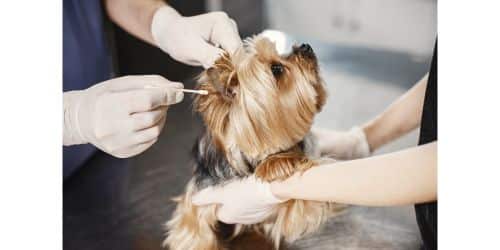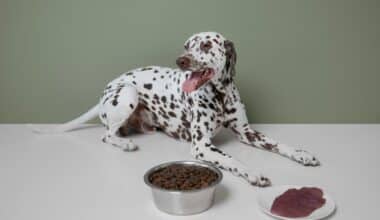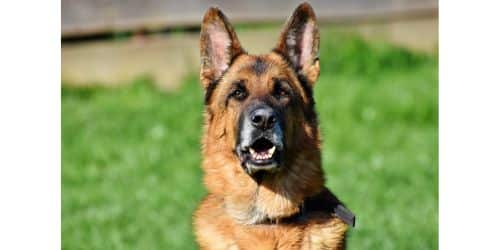When our pets are diagnosed with giardia, a common intestinal parasite, they must receive the proper diet to aid in their recovery and well-being. In this blog post, we’ll look at what to feed a dog with giardia and how to make sure their nutritional needs are satisfied during this difficult time. You may help your dog fight giardia and regain their health by following these suggestions and working together with your veterinarian.
Understanding Giardia and Its Impact on Nutrition
Giardia is a tiny parasite that affects dogs’ gastrointestinal tract, causing symptoms such as diarrhea, weight loss, and loss of appetite. Because giardia can interfere with the normal absorption of nutrients from food, it is critical to meet the nutritional needs of affected dogs.
A proper diet is critical during this period because it strengthens the immune system, promotes healing, and aids in the fight against parasites. It is crucial to remember, however, that each dog’s nutritional needs will vary depending on their ailment, overall health, and any other circumstances involved. Consult your veterinarian to identify the best technique for your dog’s specific requirements.
Transitioning to a Digestible Diet
When dealing with giardia, it is often advised to transition your dog to a highly digestible feed. A digestible diet reduces the stress on the gastrointestinal tract, allowing for improved nutrient absorption. Here’s how to make the switch:
- Choose a Quality, Digestible Food: Select a high-quality, readily digested dog food made from wholesome components. Look for “limited ingredient” or “sensitive stomach” solutions, as these are kinder on the digestive system.
- Gradual Transition: Mix the new food in with your dog’s current diet to gradually introduce it. Begin with a tiny bit of the new food and gradually increase the proportion over a week or so. This gradual shift aids in the prevention of intestinal distress.
- Monitor for Sensitivities: Keep a close eye on how your dog reacts to the new diet. Some giardia-infected dogs may also have dietary sensitivities or allergies. Consult your veterinarian if you experience any unpleasant effects or if symptoms worsen.
What to Feed a Dog with Giardia
When feeding a giardia-infected dog, it is critical to focus on giving a meal that is easily digested, aids recovery, and promotes gastrointestinal health. Here are some guidelines on what to feed a dog with giardia:
#1. Prescription Diets:
Your physician may offer prescription meals designed specifically for pets with gastrointestinal disorders or sensitive stomachs. These diets are designed to be highly digestible and can aid in the management of giardia symptoms. Use the type and brand of prescription diet recommended by your veterinarian.
#2. Boiled Chicken and Rice:
For dogs with giardia, a bland diet of boiled chicken and white rice is generally recommended. Cook plain white rice and boneless, skinless chicken breast. Combine them in a 1:2 ratio (one part chicken to two parts rice) and feed little, frequent meals. This combination contains protein and carbs that are easily digested.
#3. Low-Fat Proteins:
Serve lean protein options like boiled or baked skinless chicken, turkey, or fish (like cod or salmon). These protein sources are easily digested and include amino acids that are required for tissue repair. Avoid fatty cuts of meat and oily foods, which might be difficult to digest.
#4. Easily Digestible Carbohydrates:
Dietary options for what to feed a dog with giardia include cooked white rice and boiled sweet potatoes. These carbs are mild on the stomach and can aid in stool firmness. Seasonings and oils should not be added to the carbohydrates.
#5. Pumpkin:
Plain, canned pumpkin (not pumpkin pie filling) can be beneficial feed for a dog with giardia. It can assist in calming the GI tract and improve stool consistency. Add a small amount of plain pumpkin (without added sugars or spices) to your dog’s meals.
#6. Probiotics:
Your veterinarian may advise you to give your dog a probiotic supplement. Probiotics can improve gastrointestinal health by restoring the balance of good bacteria in the gut. Follow your veterinarian’s advice on the best probiotic supplement and dosage.
Remember to introduce new meals gradually and observe your dog’s reaction. If you detect any bad reactions or symptoms intensifying, stop using the diet and visit your veterinarian.
Working closely with your veterinarian to design a healthy nutrition plan for your giardia-infected dog is critical. They can make tailored recommendations based on your dog’s condition, nutritional requirements, and any other underlying health concerns.
Key Nutrients for Recovery and Immune Support
Providing vital nutrients that help the recovery process and enhance the immune system is critical during giardia treatment. The following nutrients should be included in your dog’s diet:
- High-Quality Protein: Protein is essential for tissue repair and immunological function. Select a dog food that provides high-quality protein sources such as lean meats or readily digestible proteins like chicken or turkey. Avoid high-fat foods, as they may aggravate gastrointestinal symptoms.
- Complex Carbohydrates: Choose complex carbs such as sweet potatoes, brown rice, or oats for sustained energy and ease of digestion. These carbs also provide important vitamins, minerals, and fiber.
- Beneficial Fats: Healthy fats, such as omega-3 fatty acids found in fish oil or flaxseed oil, should be included as feed for a dog with giardia. These fats help the immune system and are anti-inflammatory. For dosage recommendations, see your veterinarian.
Electrolyte and Hydration Balance
Maintaining regular hydration is critical for dogs with giardia since diarrhea depletes their body fluids quickly. Additionally, electrolyte loss from diarrhea can upset the body’s balance. Here’s how you can keep your dog hydrated and electrolyte-balanced:
- Fresh Water Access: Clean and fresh water should be available at all times to encourage your dog to drink. Maintain an easily accessible and regularly replenished water bowl.
- Hydration Support: If your dog isn’t drinking enough water due to a loss of appetite or illness, get advice from your veterinarian. They may propose administering water with a syringe or dropper, or they may offer special electrolyte solutions to restore hydration and electrolyte balance.
- Electrolyte-Rich Foods: Include foods high in electrolytes in your dog’s diet. As a supplement, you can provide tiny amounts of unsalted broth or diluted Pedialyte. However, before adding any additional supplements to your dog’s diet, ask your veterinarian.
Portion Control and Feeding Frequency
It is critical to consider feeding frequency and portion control when you feed a dog with giardia to help their recovery and digestive health. Here are some pointers to keep in mind:
- Smaller and More Frequent Meals: Rather than feeding your dog one or two large meals each day, divide their daily food intake into many smaller meals spread throughout the day. This method can help to lessen the load on the digestive system and improve nutrient absorption.
- Portion Control: Stick to the portion quantities prescribed by your physician or the dog food manufacturer. Overfeeding can put additional strain on the gastrointestinal system, while underfeeding may not provide your dog with enough nutrients to recover. Portion sizes should be adjusted based on your dog’s weight, activity level, and specific needs.
- Weight Checking: Keep track of your dog’s weight as they recover from giardia. Consult your veterinarian if you detect severe weight loss or gain and change your meal proportions accordingly.
- Gradual Transition: If you need to adjust your feed to treat a dog with giardia, do so gradually over a few days. Introduce the new food by combining it in increasing proportions with the old food. This slow transition helps to avoid intestinal discomfort and allows your dog’s system to acclimate to the new diet.
- Treats and Table Scraps: Limit or avoid offering your dog treats or table scraps while they are recovering from giardia. Stick to their advised diet to ensure they get the nutrition they need while avoiding potential irritants or allergens.
Supplemental Support
In addition to a well-balanced diet, your veterinarian may advise you to take certain vitamins to help your dog recover from giardia. These supplements can help with certain dietary deficits as well as the immune system. Here are a few feed nutrients that are frequently recommended for a dog with giardia:
- Probiotics: Probiotics are helpful microorganisms that support a healthy gut microbiome. They can help restore the balance of healthy bacteria in the digestive tract, which giardia can upset. Consult your veterinarian for the best probiotic supplement and dose.
- Digestive Enzymes: Digestive enzymes can help with nutrient digestion and absorption, particularly if your dog’s digestive tract is damaged. These enzymes aid in the appropriate use of nutrients from the diet by the body. Your veterinarian will be able to advise you on the best digestive enzyme supplement for your dog.
- Immune-Boosting Supplements: Certain supplements, such as vitamin C, vitamin E, and antioxidants, can aid in the rehabilitation of your dog’s immune system. However, before introducing any new supplements, ask your veterinarian because excessive doses might be dangerous.
Monitoring Progress and Adjusting the Diet
As your dog recovers from giardia, it is critical to monitor their progress and make any required dietary changes. Keeping in touch with your veterinarian regularly is essential during this period. Here are some factors to consider:
- Symptom Improvement: Keep a close eye on your dog’s symptoms, such as stool consistency, appetite, and energy levels. If you see changes, it could be that their present diet is working properly. However, visit your veterinarian to see if any changes are required.
- Weight Control: Monitor your dog’s weight throughout the rehabilitation process. If your dog is losing weight or not gaining weight as planned, your veterinarian may advise you to change portion sizes or add calorie-dense foods to promote healthy weight gain.
- Follow-up Veterinary Visits: It is critical to visit your veterinarian regularly to monitor your dog’s progress and make any required changes to their treatment plan. These visits allow you to discuss your dog’s nutrition and ensure it meets their continuing needs.
Observing Good Hygiene Practices
Aside from focusing on your dog’s nutrition, it’s critical to maintain excellent cleanliness practices to avoid reinfection and safeguard other pets and family members. Here are some hygiene suggestions:
- Clean Living Environment: Clean and disinfect your dog’s living area regularly, including their bedding, toys, and food bowls. Use pet-safe cleaning products that your doctor has prescribed.
- Good Waste Disposal: Practice good waste disposal by cleaning up your dog as soon as possible, especially if they have diarrhea. To avoid contamination, bag and securely dispose of waste.
- Hand Hygiene: After touching your dog, cleaning up after them, or coming into contact with their feces, thoroughly wash your hands with soap and water. This aids in the prevention of giardia and other possible infections.
Patience and Support
Dealing with giardia can be a difficult experience for both you and your dog. Throughout the recuperation process, it is critical to be patient and provide emotional support. Here are some pointers:
- Calm Environment: Create a relaxing and stress-free atmosphere for your dog. Reduce any potential stressors that may impair their overall well-being, such as loud noises or unfamiliar visits.
- Comfort and Affection: During this time, give your dog plenty of comfort and affection. Quality time spent together, gentle massages, and calming tones can all assist in relieving tension and building a sense of well-being.
- Always Follow Your Veterinarian’s Directions: When it comes to your dog’s treatment, medicine, and food rules, always follow your veterinarian’s instructions and suggestions. They have the knowledge and experience to walk you through the rehabilitation process and answer any concerns or questions you may have.
What is giardia?
Giardia is a tiny parasite that can infect the gastrointestinal tracts of dogs, humans, and other animals. It is one of the most prevalent intestinal parasites discovered in dogs throughout the world. The parasite, known as Giardia duodenalis or Giardia intestinalis, has two stages: dormant cyst and active trophozoite.
How does giardia affect dogs?
Giardia can cause a variety of symptoms in dogs, from asymptomatic infections to mild to severe gastrointestinal complaints. The following are some of the most prevalent ways giardia can affect dogs:
- Asymptomatic Infection
- Gastrointestinal Upset
- Dehydration
- Poor Coat Condition
- Immune System Complications
What foods are safe for dogs with giardia?
When it comes to giardia food for dogs, it’s critical to provide an easily digestible diet, mild on the gastrointestinal tract, and promotes recuperation. Here are some safe food options to feed a dog with giardia:
- Lean Proteins
- Easily Digestible Carbohydrates
- Low-Fat Options
- Plain Yogurt
- Boiled Eggs
- Prescription Diets
How long does it take for giardia to go away in dogs?
The duration of giardia infection in dogs can vary depending on several factors, including the dog’s overall health, the severity of the illness, treatment efficacy, and the exact treatment technique utilized. If left untreated, giardia infections in dogs can continue anywhere from a few weeks to many months.
Most uncomplicated cases of giardia in dogs can be treated in 1 to 2 weeks with appropriate therapy. Treatment usually consists of a combination of veterinary-prescribed medication and supportive care.
Conclusion
Taking care of a dog with giardia requires a comprehensive approach that includes providing the right nutrition, maintaining proper hygiene, and offering emotional support. By following the guidelines outlined in this blog post and working closely with your veterinarian, you can help your dog overcome giardia and return to a healthy, happy life.
Remember, each dog’s condition is unique, and their nutritional needs may vary. It’s important to consult with your veterinarian to create a tailored diet plan and treatment strategy that suits your dog’s specific requirements. With your dedication and the support of your veterinary team, your dog can overcome giardia and thrive once again.
Related Articles
- Best Hydrolyzed Protein Dog Food: 2023 Reviews
- 21 Worst Dog Food Brands To Avoid In 2023
- 20 Best Large Breed Puppy Food In 2023: Reviews and Comparisons
- How To Boil Chicken For Dogs: Detailed Guide
- 7 Best Low Protein Dog Food In 2023 (+Recipes)






